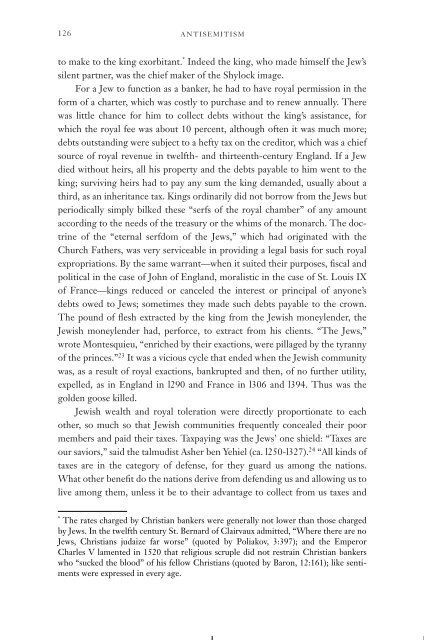Anti-semitism: Myth and Hate from Antiquity to the Present
Anti-semitism: Myth and Hate from Antiquity to the Present
Anti-semitism: Myth and Hate from Antiquity to the Present
Create successful ePaper yourself
Turn your PDF publications into a flip-book with our unique Google optimized e-Paper software.
126 ANTISEMITISM<br />
<strong>to</strong> make <strong>to</strong> <strong>the</strong> king exorbitant. * Indeed <strong>the</strong> king, who made himself <strong>the</strong> Jew’s<br />
silent partner, was <strong>the</strong> chief maker of <strong>the</strong> Shylock image.<br />
For a Jew <strong>to</strong> function as a banker, he had <strong>to</strong> have royal permission in <strong>the</strong><br />
form of a charter, which was costly <strong>to</strong> purchase <strong>and</strong> <strong>to</strong> renew annually. There<br />
was little chance for him <strong>to</strong> collect debts without <strong>the</strong> king’s assistance, for<br />
which <strong>the</strong> royal fee was about 10 percent, although often it was much more;<br />
debts outst<strong>and</strong>ing were subject <strong>to</strong> a hefty tax on <strong>the</strong> credi<strong>to</strong>r, which was a chief<br />
source of royal revenue in twelfth- <strong>and</strong> thirteenth-century Engl<strong>and</strong>. If a Jew<br />
died without heirs, all his property <strong>and</strong> <strong>the</strong> debts payable <strong>to</strong> him went <strong>to</strong> <strong>the</strong><br />
king; surviving heirs had <strong>to</strong> pay any sum <strong>the</strong> king dem<strong>and</strong>ed, usually about a<br />
third, as an inheritance tax. Kings ordinarily did not borrow <strong>from</strong> <strong>the</strong> Jews but<br />
periodically simply bilked <strong>the</strong>se “serfs of <strong>the</strong> royal chamber” of any amount<br />
according <strong>to</strong> <strong>the</strong> needs of <strong>the</strong> treasury or <strong>the</strong> whims of <strong>the</strong> monarch. The doctrine<br />
of <strong>the</strong> “eternal serfdom of <strong>the</strong> Jews,” which had originated with <strong>the</strong><br />
Church Fa<strong>the</strong>rs, was very serviceable in providing a legal basis for such royal<br />
expropriations. By <strong>the</strong> same warrant—when it suited <strong>the</strong>ir purposes, fiscal <strong>and</strong><br />
political in <strong>the</strong> case of John of Engl<strong>and</strong>, moralistic in <strong>the</strong> case of St. Louis IX<br />
of France—kings reduced or canceled <strong>the</strong> interest or principal of anyone’s<br />
debts owed <strong>to</strong> Jews; sometimes <strong>the</strong>y made such debts payable <strong>to</strong> <strong>the</strong> crown.<br />
The pound of flesh extracted by <strong>the</strong> king <strong>from</strong> <strong>the</strong> Jewish moneylender, <strong>the</strong><br />
Jewish moneylender had, perforce, <strong>to</strong> extract <strong>from</strong> his clients. “The Jews,”<br />
wrote Montesquieu, “enriched by <strong>the</strong>ir exactions, were pillaged by <strong>the</strong> tyranny<br />
of <strong>the</strong> princes.” 23 It was a vicious cycle that ended when <strong>the</strong> Jewish community<br />
was, as a result of royal exactions, bankrupted <strong>and</strong> <strong>the</strong>n, of no fur<strong>the</strong>r utility,<br />
expelled, as in Engl<strong>and</strong> in l290 <strong>and</strong> France in l306 <strong>and</strong> l394. Thus was <strong>the</strong><br />
golden goose killed.<br />
Jewish wealth <strong>and</strong> royal <strong>to</strong>leration were directly proportionate <strong>to</strong> each<br />
o<strong>the</strong>r, so much so that Jewish communities frequently concealed <strong>the</strong>ir poor<br />
members <strong>and</strong> paid <strong>the</strong>ir taxes. Taxpaying was <strong>the</strong> Jews’ one shield: “Taxes are<br />
our saviors,” said <strong>the</strong> talmudist Asher ben Yehiel (ca. l250-l327). 24 “All kinds of<br />
taxes are in <strong>the</strong> category of defense, for <strong>the</strong>y guard us among <strong>the</strong> nations.<br />
What o<strong>the</strong>r benefit do <strong>the</strong> nations derive <strong>from</strong> defending us <strong>and</strong> allowing us <strong>to</strong><br />
live among <strong>the</strong>m, unless it be <strong>to</strong> <strong>the</strong>ir advantage <strong>to</strong> collect <strong>from</strong> us taxes <strong>and</strong><br />
* The rates charged by Christian bankers were generally not lower than those charged<br />
by Jews. In <strong>the</strong> twelfth century St. Bernard of Clairvaux admitted, “Where <strong>the</strong>re are no<br />
Jews, Christians judaize far worse” (quoted by Poliakov, 3:397); <strong>and</strong> <strong>the</strong> Emperor<br />
Charles V lamented in 1520 that religious scruple did not restrain Christian bankers<br />
who “sucked <strong>the</strong> blood” of his fellow Christians (quoted by Baron, 12:161); like sentiments<br />
were expressed in every age.
















